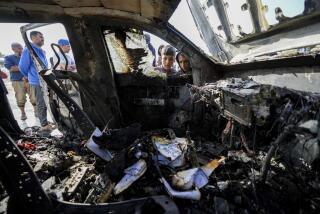Powell Trip to Focus on Fortifying Resolve of Coalition Partners
- Share via
WASHINGTON — Secretary of State Colin L. Powell plans to visit India and Pakistan late this week, kicking off the post-bombing phase of U.S. diplomacy by talking with two nuclear-armed rivals who have joined the anti-terrorism alliance.
In other diplomatic efforts, President Bush, Vice President Dick Cheney and Powell conducted an intense round of telephone calls Sunday to explain to world leaders the reasons for the attack on Afghanistan, where terrorist leader Osama bin Laden makes his headquarters. State Department officials said the calls and Powell’s visit are part of a coalition-maintenance effort that may prove more decisive in the war on terrorism than the military action.
“Coalition management means keeping in touch with people, getting the word out properly, taking advantage of any opportunities that might come up to build on the coalition and making sure the coalition remains safe and solid,” a senior State Department official said.
Several Leaders Get Advance Notice
Some allied, Arab and Central Asian governments were given advance word of the attacks, officials said; more than a dozen others were contacted as the bombs began to fall.
The White House said Bush telephoned Russian President Vladimir V. Putin, whose support carries enormous symbolic weight because of Russia’s status as the world’s No. 2 nuclear power. Israeli Prime Minister Ariel Sharon got a one-hour advance notice that the attacks were to begin. Powell called Mexican President Vicente Fox, Argentine President Fernando de la Rua, Japanese Prime Minister Junichiro Koizumi, U.N. Secretary-General Kofi Annan, the emir of Bahrain Sheik Hamed ibn Isa Khalifa, Sultan Kaboos ibn Said of Oman and the leaders of five former Soviet republics: Georgia, Kazakhstan, Ukraine, Tajikistan and Turkmenistan.
All U.S. embassies around the world were told to explain the reasons behind the military activity to local governments, whether coalition members or not.
But the senior State Department official said the U.S. diplomatic objective goes far beyond gaining international support for the bombing of Afghanistan.
“The military actions are important, but they’re not the whole effort,” the official said. “It’s a broad effort--diplomatic, legal and financial steps are vital for the long term. We’ll build on those steps as we continue military action.”
It became clear Sunday that the military alliance is far narrower than the diplomatic coalition. The first wave of airstrikes was carried out by the United States and Britain, with minimal help from other countries.
The Pentagon said warplanes took off from a base in the United States, from the British-controlled Indian Ocean island of Diego Garcia and from aircraft carriers. Cruise missiles were fired by U.S. and British warships.
Bush said three NATO allies--Germany, France and Canada--along with Australia will provide military units for later phases of the campaign.
Bases in Pakistan and Uzbekistan--both of which share long borders with Afghanistan--were not used, according to Pentagon officials.
In his statement marking the start of military action, Bush described a very broad coalition. “More than 40 countries in the Middle East, Africa, Europe and across Asia have granted air transit or landing rights,” he said. “Many more have shared intelligence. We are supported by the collective will of the world.”
But much of the assistance comes from countries that have chosen to remain anonymous, probably because of concern that being tied too closely to the U.S. military strikes would provoke serious unrest at home. Asked for a list of the more than 40 countries cited by Bush, a senior administration official said, “We want to let the other countries announce themselves.”
Pakistan in Delicate Spot
Nowhere is the situation more delicate than in Pakistan, an overwhelmingly Muslim country that has religious and ethnic ties to Afghanistan. Although President Pervez Musharraf said shortly after the Sept. 11 attacks on the United States that his government had no choice but to line up against terrorism, public opinion in Pakistan is clearly mixed.
On Sunday, the government issued a statement emphasizing Pakistan’s preference for a peaceful diplomatic solution.
“We regret that diplomatic efforts to convince Taliban leadership to respond to the international demands did not succeed and now military action has been taken against the Taliban regime,” the communique said. “Pakistan did whatever it could to convince the Taliban leadership of the gravity of the situation and take the right decisions in the interest of the Afghan people. . . . We also hope that the operations will end soon.”
Before the Sept. 11 attacks, U.S. policy clearly favored democratic India over the military regime in Pakistan (the two countries have fought three wars and numerous skirmishes over the disputed territory of Kashmir). But Pakistan’s geographical position on Afghanistan’s southern border has made it one of the most important--and most problematic--of the countries in the counter-terrorism campaign.
State Department sources said Powell would not engage in any diplomatic efforts to settle the India-Pakistan conflict over Kashmir during his trip. Pakistan had requested a new U.S. initiative in the disputed Himalayan territory in exchange for its support for the war on terrorism.
Details of exactly when Powell will leave and how long he will stay in each country were not released.
More to Read
Sign up for Essential California
The most important California stories and recommendations in your inbox every morning.
You may occasionally receive promotional content from the Los Angeles Times.













